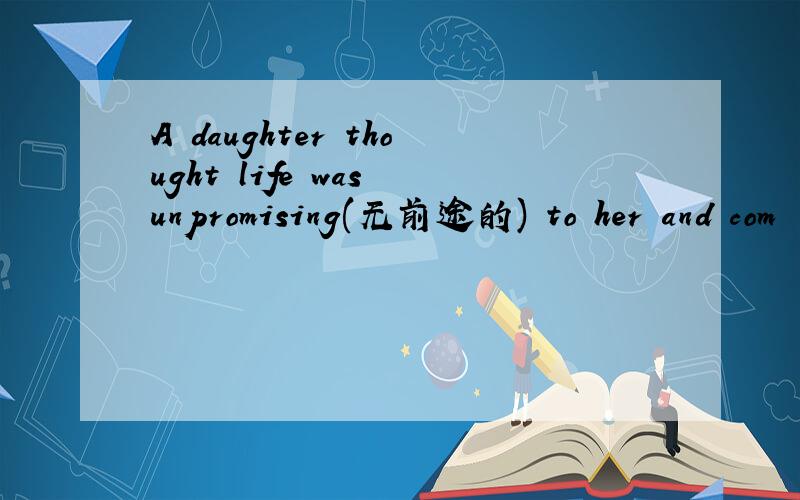A daughter thought life was unpromising(无前途的) to her and complained to her father about it. She did not know how she was going to
and wanted to give up. She was
of fighting and struggling. It seemed as if one problem was just solved before a new one
.
Her father, a cook, took her to the
. He filled three pots with water and placed each on a high
. Soon the pots came to the
. In one he placed carrots, in the second he placed eggs, and the last he placed ground coffee beans. He let them sit and boil, without saying a word.
The daughter sucked her teeth and
waited, asking repeatedly what he was doing. In about twenty minutes he turned off the
He fished the carrots out and placed them in a bowl. He pulled the eggs out and placed them in a bowl. Then he spooned the coffee out and placed it in another. Turning to her he asked, “Darling, what do you see?”
“Carrots, eggs, and coffee,” she replied.
He brought her closer and asked her to
the carrots. She did and noted that they were soft. He then asked her to take an egg and break it. After pulling off the
, she observed the hard-boiled egg! Finally, he asked her to taste the coffee. She smiled
she tasted its rich flavor. She humbly asked, “What does it mean, Father?”
He explained that each of them had faced the same
, boiling water, but each
differ-
ently. The carrot went in
and hard. But after being subjected to the boiling water, it
and became weak. The egg had been
. Its thin outer shell had protected its liquid interior. But after sitting
the boiling water, its inside became hardened. The ground coffee beans were unique,
. After they were in the boiling water, they had
the water.
“Which are you?” he asked his daughter. “When adversity(逆境) knocks on your door,
do you respond? Are you a carrot, an egg, or a coffee bean?”
| 小题1: | | A.make out | B.make it | | C.make up | D.make through | |
| 小题2: | | A.typical | B.conscious | | C.tired | D.warned | |
| 小题3: | | A.raised | B.arose | | C.disappeared | D.faded | |
| 小题4: | | A.room | B.market | | C.kitchen | D.grocery | |
| 小题5: | | A.shelf | B.temperature | | C.fire | D.table | |
| 小题6: | | A.boil | B.cool | | C.hot | D.smoke | |
| 小题7: | | A.happily | B.calmly | | C.casually | D.impatiently | |
| 小题8: | | A.lights | B.burners | | C.tap | D.water | |
| 小题9: | | A.see | B.carry | C.feel | D.fetch | |
| 小题10: | | A.shell | B.pack | C.bag | D.cover | |
| 小题11: | | A.since | B.as | C.before | D.if | |
| 小题12: | | A.occasion | B.point | | C.variety | D.adversity | |
| 小题13: | | A.reflected | B.answered | | C.abandoned | D.reacted |
小题1:B
小题2:C
小题3:B
小题4:C
小题5:C
小题6:A
小题7:D
小题8:B
小题9:C
小题10:A
小题11:B
小题12:D
小题13:D
小题14:C
小题15:A
小题16:B
小题17:C
小题18:A
小题19:D
小题20:B
小题1:B make it设法做到,获得成功,与后面的and wanted to give up相照应。make out辨认出;make up构成;make through通过。
小题2:C be tired of对……厌倦/厌烦。typical典型的;conscious有意识的。
小题3: B arise出现。句意:似乎一个问题刚解决另一个就会出现。raise提升;fade消退;disappear消失。
小题4: C 由后文可知他们应该是进了厨房。
小题5: C a high fire旺火。
小题6: A 由前文可知此处意为锅里的水开了。
小题7: D 由后文asking repeatedly what he was doing可知女儿此时已经不耐烦了(impatiently)。
小题8: B turn off the burners关掉炉火。
小题9: C 由后文…they were soft可知此处为“感觉”。
小题10:A put off the shell意为“剥去蛋壳”。
小题11: B as在此处引导一个时间状语从句。
小题12: D 此处这位父亲把开水比作不幸、灾难(adversity)。
小题13: D react起反应,符合语境。
小题14: C strong and hard强硬,与下一句中的weak相对应。
小题15:A soften变软,符合语境。
小题16: B easily-broken易碎的。
小题17: C through此处意为“经由,凭借”。
小题18: A however可是,然而,表转折。
小题19: D 句意:咖啡豆改变了水。
小题20:B 句意:当灾难降临在你的头上时,你会怎么反应呢?
|
